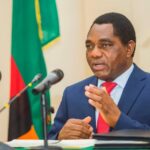The Energy Regulation Board (ERB) has explained that the current fuel shortage in some parts of Zambia is primarily due to unrest in neighboring Mozambique, which has forced transporters of petroleum products to seek longer alternative routes. ERB Director of Corporate and Consumer Affairs, Mwiika Malindima, confirmed this during an interview with ZNBC News, revealing that the instability in Mozambique has significantly disrupted the usual transportation channels.
In addition to the unrest in Mozambique, Mr. Malindima pointed out that Zimbabwe has imposed a tax on transporters who are passing through the country to deliver fuel to Zambia. This added financial burden has further strained the fuel supply chain, compounding the challenges the country is facing.
He also emphasized that internal issues within Zambia, particularly with fuel dealers, are contributing to the shortage. These factors combined have created a bottleneck, making it more difficult to ensure a stable and reliable fuel supply for the country.
While the ERB is working to address these issues, Mr. Malindima also highlighted the board’s commitment to mitigating the effects of the ongoing drought on Zambia’s power generation. One of the measures being promoted is the use of alternative energy sources to ensure that the country’s energy needs are met without over-reliance on hydroelectric power, which has been severely impacted by low water levels.
Despite these efforts, the situation remains challenging, with many Zambians voicing their frustrations over rising fuel prices and the recurring fuel shortages. In response to the ERB’s statements, some critics have called for more transparency regarding the volume of fuel typically transported from Mozambique during periods of stability versus times of unrest. Others have expressed dissatisfaction with the government’s handling of the fuel procurement process, arguing that the current administration has failed to effectively address the issue.
The ongoing fuel crisis, compounded by the tax measures from Zimbabwe and Mozambique’s unrest, continues to impact the economy, with concerns growing over its broader implications on inflation, transportation costs, and daily life for many Zambians.






